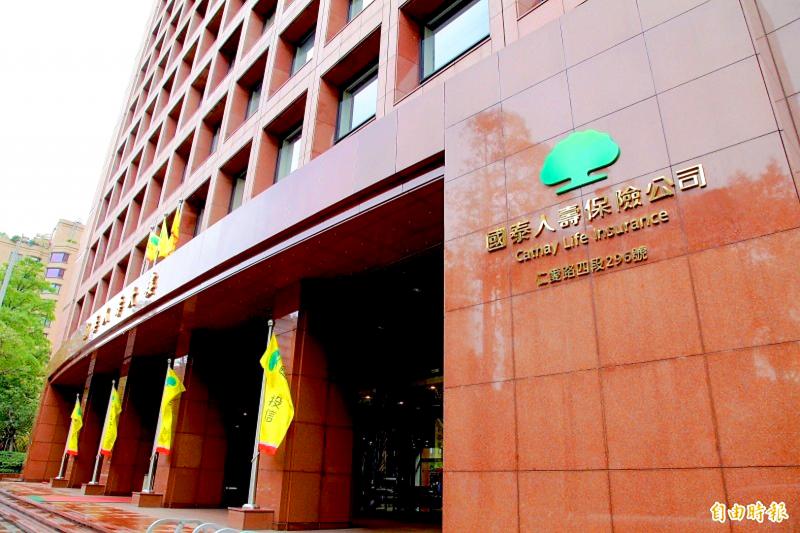The capital adequacy of the nation’s life insurers would remain healthy even if the New Taiwan dollar continues trading above NT$29 to the US dollar, Financial Supervisory Commission Chairman Thomas Huang (黃天牧) told lawmakers at a meeting of the legislature’s Finance Committee on Thursday.
The NT dollar climbed above the central bank’s alleged threshold of NT$29 on Oct. 6 and central bank Governor Yang Chin-long (楊金龍) earlier this month said that it might become the new normal for the local currency to trade above NT$29 against the greenback.
In light of the strong NT dollar, the Insurance Bureau in August ran a stress test on the nation’s life insurance companies to assess the impact of exchange-rate risk on their finances, Huang said.

Photo: Wu Chi-lun, Taipei Times
In the test with a scenario that the local currency was trading at NT$28 to the US dollar, the net-worth-to-assets ratio of all the nation’s life insurance companies remained above 3 percent, the regulatory minimum, except for Hontai Life Insurance Co (宏泰人壽), the commission said.
Hontai Life, which registered an equity-to-asset ratio of 1.88 percent at the end of June, has been asked to improve its financial strength and if the insurer fails to lift the gauge above 3 percent by the end of this year, the commission would impose corrective measures on the firm, such as limiting its operations, it said.
“Overall, it seems that local life insurance companies could handle a strong NT dollar,” Huang told the meeting.
Increased net profit at life insurance companies last year are expected to help cushion their foreign-exchange losses, he said.
Local life insurance companies reported combined foreign-exchange losses of NT$195 billion (US$6.74 billion) as of the end of August, up 32 percent from a year earlier, as the fast appreciation of the local currency made their hedging strategies ineffective and slashed the monetary value of their assets denominated in US dollars, commission data showed.
However, investment gains, thanks to a booming local stock market and volatility on global financial markets, helped offset those losses, enabling the firms to post a combined pretax profit of NT$186 billion for the first eight months of the year, up 12 percent year-on-year, the data showed.

TAKING STOCK: A Taiwanese cookware firm in Vietnam urged customers to assess inventory or place orders early so shipments can reach the US while tariffs are paused Taiwanese businesses in Vietnam are exploring alternatives after the White House imposed a 46 percent import duty on Vietnamese goods, following US President Donald Trump’s announcement of “reciprocal” tariffs on the US’ trading partners. Lo Shih-liang (羅世良), chairman of Brico Industry Co (裕茂工業), a Taiwanese company that manufactures cast iron cookware and stove components in Vietnam, said that more than 40 percent of his business was tied to the US market, describing the constant US policy shifts as an emotional roller coaster. “I work during the day and stay up all night watching the news. I’ve been following US news until 3am

UNCERTAINTY: Innolux activated a stringent supply chain management mechanism, as it did during the COVID-19 pandemic, to ensure optimal inventory levels for customers Flat-panel display makers AUO Corp (友達) and Innolux Corp (群創) yesterday said that about 12 to 20 percent of their display business is at risk of potential US tariffs and that they would relocate production or shipment destinations to mitigate the levies’ effects. US tariffs would have a direct impact of US$200 million on AUO’s revenue, company chairman Paul Peng (彭雙浪) told reporters on the sidelines of the Touch Taiwan trade show in Taipei yesterday. That would make up about 12 percent of the company’s overall revenue. To cope with the tariff uncertainty, AUO plans to allocate its production to manufacturing facilities in

Six years ago, LVMH’s billionaire CEO Bernard Arnault and US President Donald Trump cut the blue ribbon on a factory in rural Texas that would make designer handbags for Louis Vuitton, one of the world’s best-known luxury brands. However, since the high-profile opening, the factory has faced a host of problems limiting production, 11 former Louis Vuitton employees said. The site has consistently ranked among the worst-performing for Louis Vuitton globally, “significantly” underperforming other facilities, said three former Louis Vuitton workers and a senior industry source, who cited internal rankings shared with staff. The plant’s problems — which have not

COLLABORATION: Given Taiwan’s key position in global supply chains, the US firm is discussing strategies with local partners and clients to deal with global uncertainties Advanced Micro Devices Inc (AMD) yesterday said it is meeting with local ecosystem partners, including Taiwan Semiconductor Manufacturing Co (TSMC, 台積電), to discuss strategies, including long-term manufacturing, to navigate uncertainties such as US tariffs, as Taiwan occupies an important position in global supply chains. AMD chief executive officer Lisa Su (蘇姿丰) told reporters that Taiwan is an important part of the chip designer’s ecosystem and she is discussing with partners and customers in Taiwan to forge strong collaborations on different areas during this critical period. AMD has just become the first artificial-intelligence (AI) server chip customer of TSMC to utilize its advanced